

No Joke - By Christian Caryl. A few months ago the Burmese government decided to let a prominent dissident out of jail.
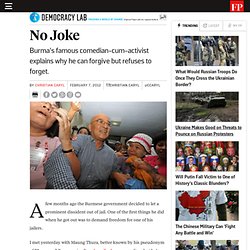
One of the first things he did when he got out was to demand freedom for one of his jailers. I met yesterday with Maung Thura, better known by his pseudonym of "Zarganar. " Zarganar is often described as a comedian, but he's much more than that. Over the years his combined role as a satirist, movie star, and social activist has made him the most famous opposition figure in Burma after Aung San Suu Kyi, the Nobel Peace Prize Laureate who is now campaigning for a seat in Burma's parliament.
(For the record, his business card describes him as an "Art-Flavored Politician. " Now 50, he has spent 11 of those years in jail (five of them in solitary confinement). "When he was a very powerful man, he sent me to jail two times," Zarganar says. Like his high-ranking colleagues, Khin Nyunt amassed vast personal wealth through his privileged access to the country's vast natural resources. Myanmar's War on Opium - In Focus.
Special Report: In the new Myanmar, the gulag endures. Burma or Myanmar: The name game. Aung San Suu Kyi has given the Burmese authorities the cold shoulder after being warned not to refer to the country as "Burma.
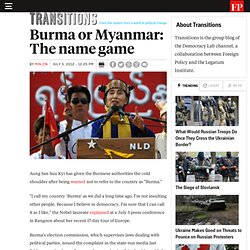
" "I call my country ‘Burma' as we did a long time ago. I'm not insulting other people. Because I believe in democracy, I'm sure that I can call it as I like," the Nobel laureate explained at a July 3 press conference in Rangoon about her recent 17-day tour of Europe. Myanmar's Budding Political Spring. The world keeps being surprised by the developing political situation in Myanmar/Burma. After they get over their surprise, the United States and its friends need to decide what they can do to help accelerate change. Last week the government of Myanmar took an important step forward in releasing some 220 political prisoners, including a number of respected and prominent dissidents, but not all such prisoners.
More need to be free. The much-anticipated move by President Thein Sein is nevertheless the most recent example pointing to Myanmar’s current government moving away from a disastrous half century of dictatorship. Burma's Tightrope - By Aung Zaw. One sweltering day in August of last year, Burmese opposition leader and Nobel Peace Prize laureate Aung San Suu Kyi arrived for the first time in the capital of her country.
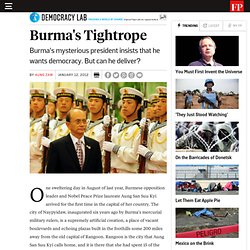
The city of Naypyidaw, inaugurated six years ago by Burma's mercurial military rulers, is a supremely artificial creation, a place of vacant boulevards and echoing plazas built in the foothills some 200 miles away from the old capital of Rangoon. Rangoon is the city that Aung San Suu Kyi calls home, and it is there that she had spent 15 of the past 22 years under house arrest. She had come to Naypyidaw to meet the man who had orchestrated her release from detention 10 months earlier. Burmese President Thein Sein, like most of the men who have ruled the country since World War II, spent almost his entire adult life as an army officer. "Burma’s Turn" by Joseph E Stiglitz.
YANGON – Here in Myanmar (Burma), where political change has been numbingly slow for a half-century, a new leadership is trying to embrace rapid transition from within. The government has freed political prisoners, held elections (with more on the way), begun economic reform, and is intensively courting foreign investment. Understandably, the international community, which has long punished Myanmar’s authoritarian regime with sanctions, remains cautious. Reforms are being introduced so fast that even renowned experts on the country are uncertain about what to make of them. But it is clear to me that this moment in Myanmar’s history represents a real opportunity for permanent change – an opportunity that the international community must not miss.
Burma's Rebound: The Triumphal Rise of Aung San Suu Kyi - SPIEGEL ONLINE - News - International. It's campaign season in Burma, but the scenes unfolding along the seemingly endless road between Rangoon and Mawlamyine, 300 kilometers (188 miles) to the southeast, suggest a quasi-religious expectation of salvation, not unlike the response to the Dalai Lama when he visits Tibetan communities in Western countries.
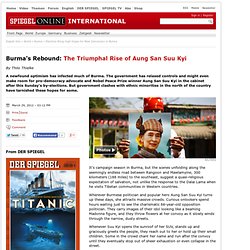
Wherever Burmese politician and popular hero Aung San Suu Kyi turns up these days, she attracts massive crowds. Curious onlookers spend hours waiting just to see the charismatic 66-year-old opposition politician. They carry images of their idol looking like a beaming Madonna figure, and they throw flowers at her convoy as it slowly winds through the narrow, dusty streets. A bittersweet celebration in Burma. RANGOON -- Yesterday, on the day of the long-awaited election, I decided to return to Independence Ward, the Rangoon neighborhood I wrote about in my piece last week on the difficult choices facing Aung San Suu Kyi.
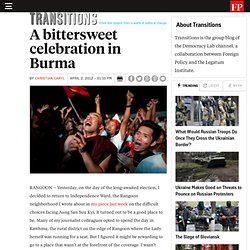
It turned out to be a good place to be. Many of my journalist colleagues opted to spend the day in Kawhmu, the rural district on the edge of Rangoon where the Lady herself was running for a seat. But I figured it might be rewarding to go to a place that wasn't at the forefront of the coverage. I wasn't disappointed. Paper Tigers - By Sebastian Strangio. YANGON, Myanmar– The most visible sign of Myanmar's recent opening can be seen on the walls of the city's monasteries and tea shops, on its newsstands and on the dashboards of its battered taxi cabs.

Portraits of democracy icon Aung San Suu Kyi -- once a ticket to arrest and interrogation by the military authorities -- are now displayed openly around Yangon, the country's largest city and former capital. The appearance of the petite Nobel laureate is a startling reminder of how far controls have been relaxed here since March, when a civilian government under President Thein Sein replaced the old ruling clique of generals. So far, Thein Sein has engineered the country's opening masterfully: His government's series of sweeping reforms, including the rapid normalization of ties with the United States, has brought Suu Kyi's National League for Democracy (NLD), Myanmar's main opposition party, back to the table. Since March, however, restrictions have been loosened. AFP/Getty Images. "The Lynchpin of Asia" by Jaswant Singh. Exit from comment view mode.
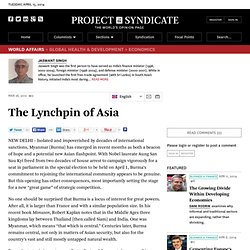
Click to hide this space NEW DELHI – Isolated and impoverished by decades of international sanctions, Myanmar (Burma) has emerged in recent months as both a beacon of hope and a potential new Asian flashpoint. With Nobel laureate Aung San Suu Kyi freed from two decades of house arrest to campaign vigorously for a seat in parliament in the special election to be held on April 1, Burma’s commitment to rejoining the international community appears to be genuine. But this opening has other consequences, most importantly setting the stage for a new “great game” of strategic competition.
No one should be surprised that Burma is a locus of interest for great powers. Why Burma Shouldn’t Listen to the IMF - By Rick Rowden. Burma is at a crossroads.
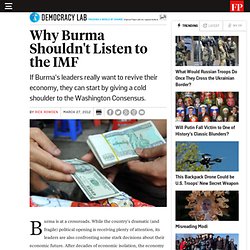
While the country's dramatic (and fragile) political opening is receiving plenty of attention, its leaders are also confronting some stark decisions about their economic future. Burma Can Bring It - By Michael Albertus and Victor Menaldo. Earlier this month, when the indefatigable Aung San Suu Kyi assumed a seat in Burma's parliament, her diminutive figure was almost lost in a sea of military uniforms.
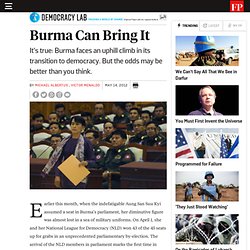
On April 1, she and her National League for Democracy (NLD) won 43 of the 45 seats up for grabs in an unprecedented parliamentary by-election. Burma gold rush. It’s not China—not even close Shwedagon Pagoda, Rangoon, Burma / Photo: racoles As it has become clear that Western sanctions on Burma will be dropped, the once-sleepy city of Rangoon has become like a gold rush village.
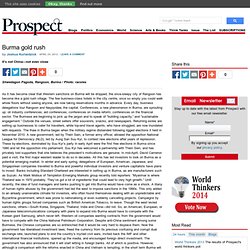
The few business-class hotels in the city centre, once so empty you could walk whole floors without seeing anyone, are now taking reservations months in advance. Every day, business delegations tour Rangoon and Naypyidaw, the capital. Conferences, a new phenomenon in Burma, are sprouting up: oil industry conferences; aid conferences; conferences on media reform; conferences on the financial sector. "How to Help Burma" by Radek Sikorski. Exit from comment view mode. Click to hide this space RANGOON – Across the Middle East, and now in Burma (Myanmar), one of the great questions of contemporary global politics has resurfaced: How can countries move from a failing authoritarianism to some form of self-sustaining pluralism? Foreign ministers everywhere, in turn, face crucial policy questions: When a country launches such a political transition, when should other countries help, and what is the best way to do so?
Happy transitions, to paraphrase Tolstoy, are all alike; but every unhappy transition is unhappy in its own way.